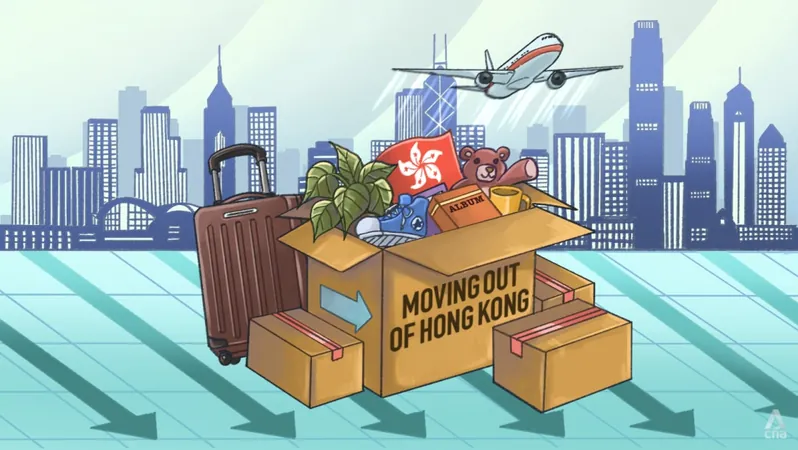
The Changing Landscape of Hong Kong: Expat Exodus and the Rise of Mainland Residents
2024-10-01
As Hong Kong continues to grapple with a significant shift in its demographic landscape, businesses and communities are feeling the impact of an ongoing exodus of expatriates and an influx of mainland Chinese residents. The changes are palpable across various sectors, with noticeable consequences for the economy and the city's vibrant culture.
In recent months, many expats have chosen to leave Hong Kong after years of residence. Among them is Mr. Andrew Liu, a Taiwanese finance manager who is relocating to France with his family after six years in the city. While his move aligns with career advancements, others are departing due to the restrictive measures during the COVID-19 pandemic and the national security law imposed by Beijing in 2020.
The exodus of expatriates has drastically affected industries such as food and beverage, real estate, and education, resulting in the closure of several businesses and a pivot in operational strategies. Liu remarked on the stark contrast in Central, where many of his favorite eateries have shut down, highlighting a decline in foot traffic and job opportunities.
Despite the departures, Hong Kong is still attracting professionals, albeit mostly from mainland China. This trend has sparked discussions about the city's reputation as a cosmopolitan hub, especially as the demographic mix shifts. Recent government reports indicate that as of mid-2023, around 270,000 non-Chinese permanent residents remain, a stark decrease from just a few years ago.
The decline in the expat population has prompted economic analysts to express concerns over Hong Kong's status as a global financial center, particularly when compared to rising alternatives like Singapore and Dubai. Data shows a nearly 50% drop in outward expatriation since 2020, with fewer returning to the city after the disruptions caused by the pandemic.
Amidst this backdrop, the influx of mainland residents is notable. Over 80% of the net inflow of new residents has come through the "one-way permit" scheme. Various talent attraction initiatives launched by the Hong Kong government, such as the Top Talent Pass Scheme and the Technology Talent Admission Scheme, have also facilitated this trend, with approximately 130,000 people settling in the city via these avenues.
Yet, this demographic shift has presented challenges as the region's cultural identity comes under scrutiny. According to experts, as businesses adapt to this new reality, companies are increasingly tailoring their offerings to appeal to mainland clients, requiring a workforce proficient in Mandarin. Yoga studios like Prajna Yoga are rethinking their marketing strategies to attract mainland clientele, demonstrating the changing priorities of hospitality industry players.
The property market is also witnessing shifts; while demand has risen and rental rates have climbed, the proportion of expatriate renters has halved compared to pre-pandemic levels. The rental landscape now reflects these changes, as Chinese nationals fill the gaps left by departing expats.
Despite the challenges, many locals remain hopeful about Hong Kong's future. A significant percentage of professionals and business leaders still perceive the city as a premier place for international opportunities, suggesting that while the nature of the expatriate community may be changing, the city’s inherent appeal endures.
As Hong Kong positions itself on the global stage with the goal of regaining its status as a top-tier cosmopolitan hub, the balance between preserving its international character while embracing the new demographic might define the next chapter for this vibrant city.
In summary, while the expat exodus poses economic and cultural challenges, the influx of mainland residents creates new opportunities, marking a transformative phase in Hong Kong’s evolving identity. The question remains: can the city succeed in blending these different worlds to foster a thriving multicultural environment?




 Brasil (PT)
Brasil (PT)
 Canada (EN)
Canada (EN)
 Chile (ES)
Chile (ES)
 España (ES)
España (ES)
 France (FR)
France (FR)
 Hong Kong (EN)
Hong Kong (EN)
 Italia (IT)
Italia (IT)
 日本 (JA)
日本 (JA)
 Magyarország (HU)
Magyarország (HU)
 Norge (NO)
Norge (NO)
 Polska (PL)
Polska (PL)
 Schweiz (DE)
Schweiz (DE)
 Singapore (EN)
Singapore (EN)
 Sverige (SV)
Sverige (SV)
 Suomi (FI)
Suomi (FI)
 Türkiye (TR)
Türkiye (TR)